Bohdan's legacy
As a child of the new Maidan distemper, we completely forgot about the 360 anniversary of the event, which forever changed the fate of not only Ukrainian, but also all-Russian stories - Pereyaslav Rade. Officially, it is dated 8 on January 1654 of the year - this very day a Cossack foreman, headed by hetman Khmelnitsky, swore an oath to the Moscow tsar. In recent Soviet times, this date was officially called the "Day of the reunification of Ukraine with Russia."
The chronicle of Samuel Velichko, a Cossack historian of the beginning of the 18th century, describes the Pereyaslav Rada as follows: “Khmelnitsky, having cut down the horde that was returning from Lithuania, laid the foundation for hostility with the khan. He immediately sent to his blessed great sovereign Alexei Mikhailovich, the All-Russian autocrat, his ambassadors, wishing, with all Little Russia Ukraine, lying on both banks of the Dnieper, with all the Zaporozhye Army to go under his strong patronage with his long-standing rights and liberties. He, the brightest All-Russian monarch, this embassy of Khmelnitsky accepted cordially and sweetly and was very pleased that such a large part of the Little Russian land remaining in Greek-Russian Orthodoxy voluntarily leans towards him, the Orthodox monarch, without any war and bloodshed, and is alienated from their yesterday's lords - the Poles, who are in the Roman faith. So, he, the all-Russian monarch, for approval under his high hand, Khmelnitsky, with all of Ukraine and the Zaporizhia Army, sent his eminent and plenipotentiary commissioners to Pereyaslav, the great boyar Vasily Vasilyevich Buturlin and his comrades who arrived in Pereyaslav on the feast of Epiphany. Arrived at the same Epiphany of Chigirin in Pereyaslav with general officers, with Colonel and significant on both banks of the Dnieper military comradeship and Khmelnitsky ... In the performance of this oath he named Khmelnitsky be together with them under the patronage and power illustrious nationwide monarch City Kiev, Bratslav, Chernigov with all of Ukraine and its povytam right on the line, that is, along the river Goryn, Ros and Grouse. "
But historical events do not fit in one day. This is a slow continuous process. Transferring mentally to that distant epoch, we will find that most of the people who inhabited Ukraine not only in the days of the Rada, but soon after, did not yet know what happened in Pereyaslav. In the "country of the Cossacks" did not leave a single newspaper. There was not even a mail that regularly delivered letters. The information was spread through friends and ... bazaars where merchants gathered once a week. Naturally, it was distorted beyond recognition, overgrown with monstrous rumors, so that no one could really understand with whom we are friends today and against whom we fight. The hetman generalists were the only more or less reliable sources - at least one could get to know the official point of view.
Throughout January and February, 1654, the messengers of Bogdan Khmelnitsky and the boyar Buturlin carried the text of the oath to the king in the regimental towns and hundreds of towns. The scribes read it to the people (not the colonels and centurions, but the scribes, as most Cossack officers did not know how to write at that time!), People listened and swore.
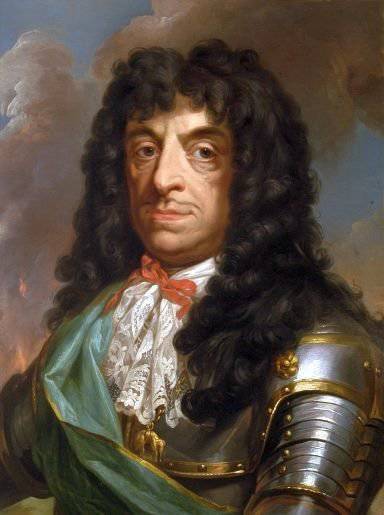
MAZEPINTS AND BOGDANOVTS. The choice of Khmelnitsky subsequently had a lot of critics and ardent fans. At the beginning of the 20th century, in Kiev, on the day of the Pereyaslavskaya Rada, groups of “Mazepians” and “Bogdanovtsy” gathered at the monument to the hetman, Bogdan was right or wrong. But, if we discard pathos, Khmelnitsky simply had no other choice.
Like any politician, he tried to solve two problems - to keep the country and himself as its head. He tried all the delights of the “multi-vector”, so popular with us under Kuchma: he was friends with the Crimean Khan and the Turkish Sultan, Magyars and Moldovans, received military help from the Russian Tsar, tried to put up with the Poles, but by 1654, he was obviously tired of running between everyone, dancing combat gopak. And the years took their toll, and the enemies grew stronger.
Attempts to "European integration" also did not lead to anything. After each battle won with Poland, Khmelnitsky concluded a peace treaty. He sat down to drink with Polish hetmans and military leaders, whom he knew well from the former service of the Commonwealth, proclaimed toasts to the health of the king, and promised to be faithful to his servant. But the feast was over. Cossacks returned to their camp, and Poles returned to Warsaw, where they again recruited troops and went to Ukraine to return everything to the order that existed before the 1648 uprising of the year. Even the Ukrainian political elite, infected with European delusions of grandeur, did not want to see Ukraine even in the form of autonomy, and Khmelnitsky its head. Khmelnitsky needed her on the scaffold, and not in Chigirin - the capital of the then Cossack state.
Bogdan himself had to blush before his “electorate” for another attempt to reach an agreement with Warsaw. Here is how the informant of the Russian government Kunakov described the “peace” of 1649 in Ukraine in his report: “And now Bogdan Khmelnytsky and the Poles will have a war for such a reason: when the flakes from the Zaporozhian Army, according to the Covenants, were taught to come to the pans and gentry estates in their houses, lords and gentry tormented and beaten and boasted: that will be your Khmelnitsky too, let us cope. And flakes came to Bogdan Khmelnitsky, more 50 000 people gathered, and YOU WANTED TO KILL IT: why did de without our advice make peace with the king? ”
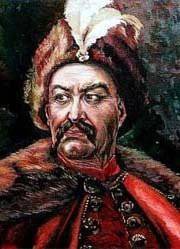
LIVE AND WITH WEAKNESSES. After becoming a symbol of the eastern choice of Ukraine after death, Khmelnitsky was not a monument during his lifetime. Contemporaries did not perceive him as an ideal. He wanted to keep the hetman's mace of its kind and pass it on to his son. Most of all he was interested in his own manor on Sabotov near Chigirin. It was the farm selected by the Poles, to which Khmelnitsky had no more legal rights than Viktor Yanukovych on Mezhyhiria, became the main reason for the transformation of Bogdan from a loyal Polish centurion to the leader of the Cossack uprising. I am sure, when choosing the oath to the Moscow Tsar, the hetman remembered this “Maetka” - Moscow immediately recognized his property rights, which Warsaw stubbornly regarded as “self-capture”.
The hetman had a huge pro-European opposition. Ukrainian tycoons (yes, it was Ukrainian - some of them even preserved Orthodoxy, like Adam Kissel, and others, like Vishnevetsky, became Catholics only in the first generation!) Did not deny Khmelnytsky. They called him an ordinary gangster, like the Cossacks. In essence, according to the laws of the Commonwealth, which constantly appealed to the "European values" Khmelnitsky was a criminal. He refused to recognize above himself the primacy of this Europe itself - the Pope, the Polish king as a secular carrier of Catholic universalism, international trading capital, already then through his compradors who exploited the raw materials of Ukraine.
Galicia was against Khmelnitsky. And Podolia. And gentry Volyn. Just those territories where in January of this year there was a seizure of state administrations. The gentry militia of the Galician-Volyn nobility fought with the Hetman's army near Pilyavtsy and Berestechko. The Polish-speaking Lviv (rich then, unlike the poor present) bought off Bogdan's army in 1648 in the form of a huge amount of one million zlotys. Even Kiev, which is now forgotten, did not recognize the hetman unconditionally - it had extremely strong Polish influence, and some of the inhabitants were Poles or people closely connected with the former Polish government. Therefore, the capital had to make provincial Chigirin on the border with Wild Field. There, the hetman felt more confident than in the ancient capital of the Russian princes, where only Lavra unconditionally kept the spiritual heritage of the deceased power of Rurikovich.
History falsifiers are trying to impose the myth that Khmelnytsky had to choose between independence and subordination to Moscow. In fact, Bogdan chose between two dependencies - from Poland and from Russia. The first promised him personal non-existence - both physical and spiritual. The second is life. Life is not only for him, but also for his Ukraine - a small country, half-suppressed by the “Europeanization” of three generations of Polish rule after the Union of Lublin 1569. Proudly sounding the wording "on both banks of the Dnieper" immediately loses its "pomp", if we recall the clarification of Samuel Velichko about its southern border - the river Ros. To the south - Tatar nomads. Donbass does not exist yet-there is also the Crimean Khanate. Sloboda (present Kharkiv region) is just settled by fugitives from the Right Bank, captured by the Poles.
Of course, Bogdan was not destined to see the consequences of his decision. He died three years after the Pereyaslav Rada. But his legacy remains. By combining efforts, the inhabitants of Moscow and Kievan Rus, created a great joint state. The descendants of the Cossack officers played a prominent role in it. Kiev Collegium gave impetus to the Slavic-Greek-Latin Academy in Moscow. A new literary language emerged, in which, alongside Pushkin and Tolstoy, outstanding masterpieces of Gogol and Bulgakov were created. Together with the Russian army, the Cossacks participated in the conquest of the Crimea. New cities with amazing architecture (Odessa, Sevastopol, Yalta) emerged on the Black Sea coast. First, in their place were, at best, squalid villages. Now the lights of culture are lit.
OTHER EUROPEANIZATION. This can also be called Europeanization. But the Europeanization of the conquerors, and not the conquered. Who thought that the Razumovskys, whom the Poles interpreted as swineweeds, would become ministers and ambassadors of the Russian Empire in Vienna, Naples and Stockholm? Who would have believed that Field Marshal Paskevich, who led the pedigree from Pasko, a Poltava Cossack, would take Warsaw in 1831? Who saw on the day of the Pereiaslav Rada a rocket taking off into space, whose engines were produced at Dnepropetrovsk Yuzhmash? I note that in Poland they did not learn how to make either rockets or airplanes. The wingspan of the “Anthea” (products of the Kiev aircraft factory!) Is impossible there under any political weather.
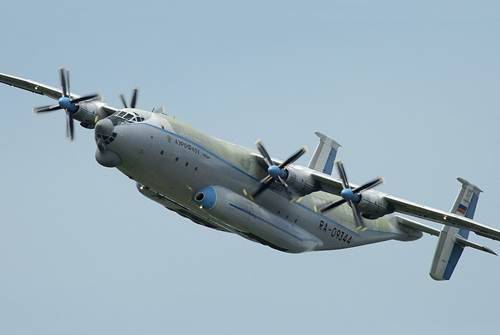
In fact, in Pereyaslav, Bogdan Khmelnitsky laid the foundation for a future integration project. One of the most impressive in world history. Not only Odessa and Sevastopol, but Petersburg would not have happened if he had acted differently.
Petty interests and mental weaknesses of the little centurion were forgotten. His farm turned into a historical anecdote, because of which the Polish-Ukrainian war broke out. The details of the “hesitations” and “services” of the future great hetman of Turkey and Poland have been erased in the mass consciousness. There is only a monument in Kiev and a mace in the hand of a bronze rider, pointing to Moscow.
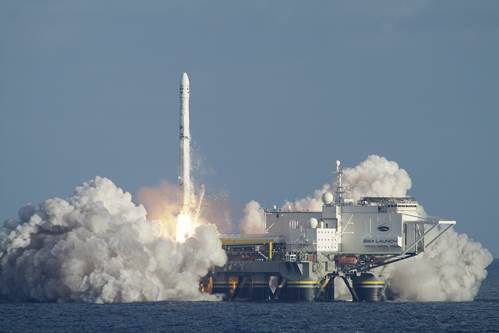
Today, the same great opposition of East and West is shaking Ukraine. The technologies and the composition of the “troops” have changed, but Lviv, as under Bogdan, “for Europe”, and the East and South of Ukraine for an alliance with Russia. Peace in the country does not come instantly, as we would like. To come to prosperity, Ukraine after Khmelnitsky had to endure Ruin. This is a crisis for many years. Political. Economic. Ideological. For too long, we tried to combine the Galician model in culture with the Dnepropetrovsk-Donetsk economy. But the reality of bonfires in the center of Kiev clearly shows that this is impossible. So Poland once tried to impose the Catholic nobility on the Orthodox “claps”. And no one wanted to retreat.
There will be more TESTS. But it’s not for nothing that his name was Bogdan?
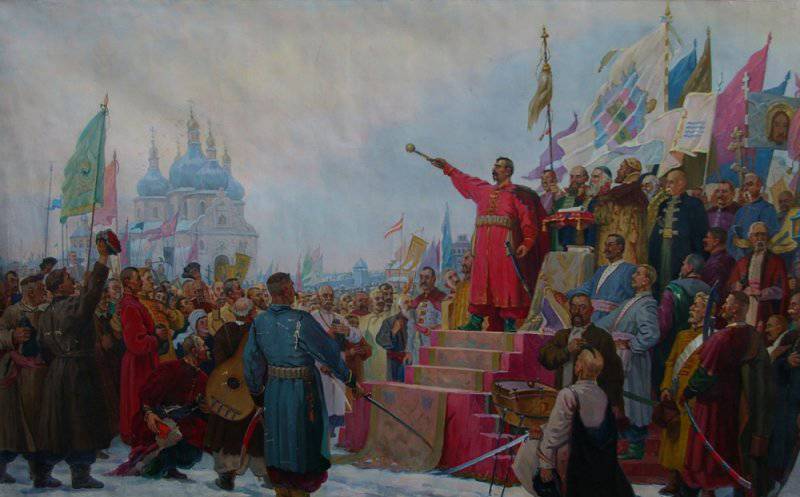
Information